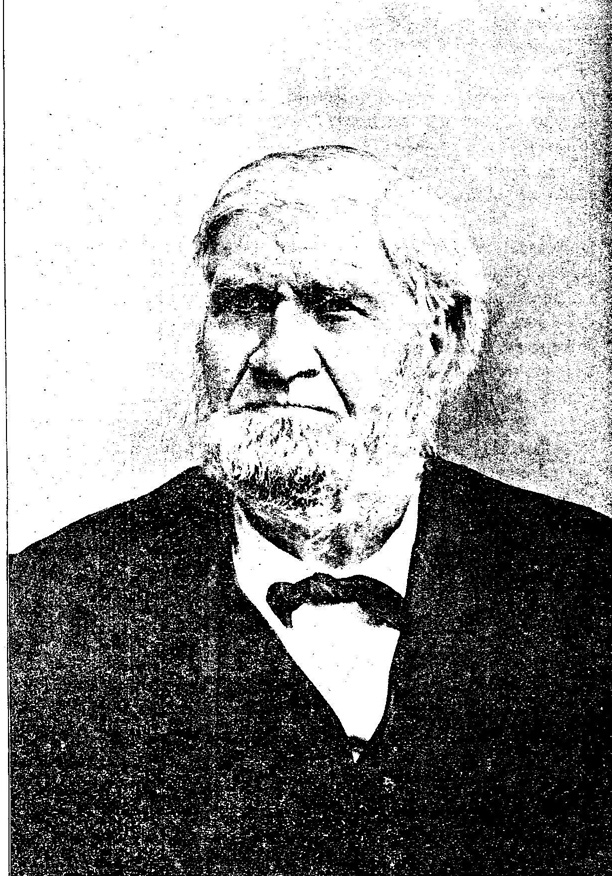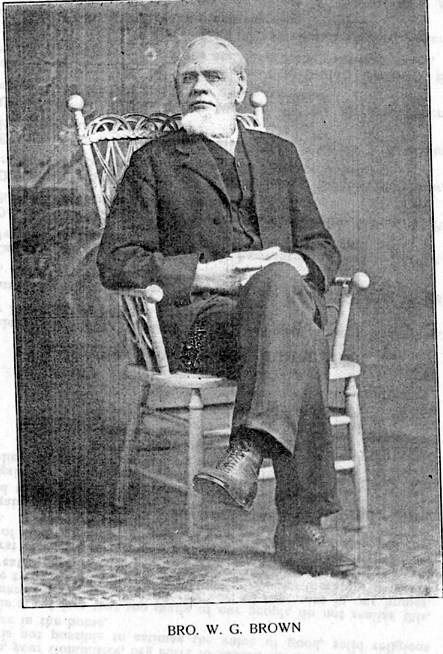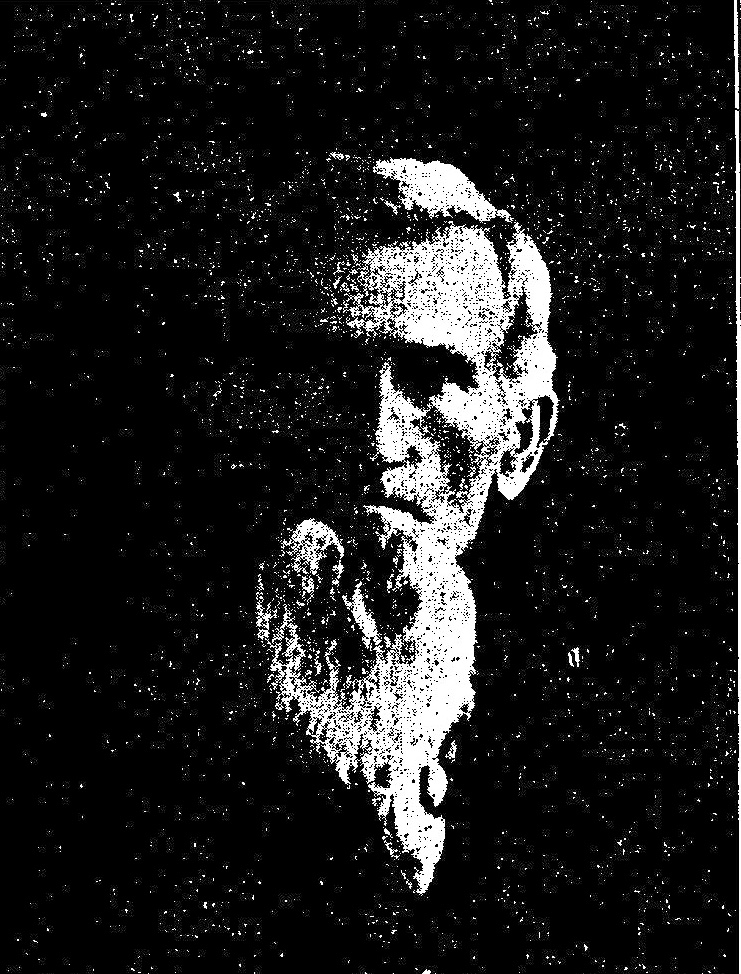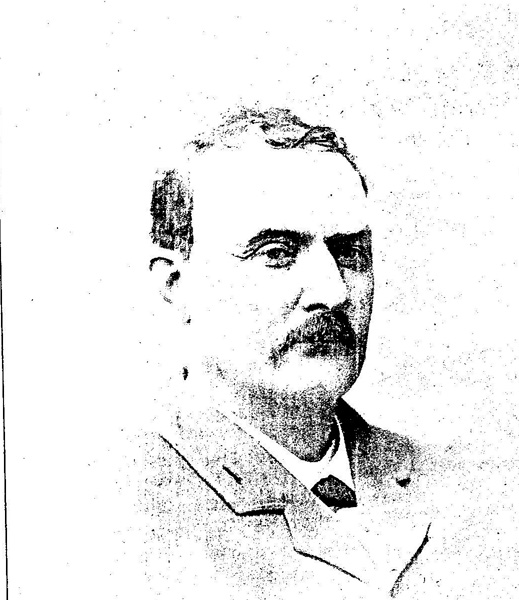Lewis County
Biography and History
________________________________________
The Twentieth Century Biographical Dictionary of Notable Americans: Volume II
April 6th, 1848, he was married to Jane Loudermilk, to which union were born eight children, three of whom with the moter preceded him to the great beyond, those survivig him being his sons Henry and Newton and daughters Mrs. J. F. Wallace of Canton, Misses Addie and Florence. The latter two never left his house and by their faithfully administering to him comfort in his sickness and cheer in his sorrow they truly won for themselves the admiration of friends and the commendation of an honorable, worthy, just and true father, for if there were ay principles loved by Bro. Brown, they were a duty well performed or a noble sacrifice made.
COLLINS, Ogilvie Nathan
under the preaching of I. H. Denton and united with the Baptist church. Conscious of a call from God to preach the Gospel of Christ, he was ordained to the full work of the minstry one year later.
The labors of this aged saint and minister of the Gospel, were confined mostly to three associations, Wyaconda, Pleasand Grove and Mt. Salem.
He was the Pastor of a number of churches, some of which he organized, and for which he built houses of worship. Bro. Collins was always held in high esteem by those who knew him and were blessed by his ministry. He was zealour, ernest and a true follower of Jesus Christ. He believed the Bible to be God's inspired message to men, and preached it as such. He found great comfort in resting securely upon its promises in his declining years, and, when the end came, went to be with Jesus. [Gilby Collins served in the Enlisted Missouri Militia in the Civil War.] Photo and bio from 1914 Wyaconda Assn. Minutes.
COOTER, James Thomas, educator, was born near Monticello, Lewis county, Mo., Dec. 2, 1858; son of Elbert Wesley and Julia (Hamilton) Cooter; grandson of James and Vina (Jones) Cooter, and of Andrew and Nancy (Chauning) Hamilton, and a descendant of German and Scotch ancestors. He acquired his preparatory education at Monticello seminary and was graduated at Wabash college, Indiana, in 1884. He attended Princeton theological seminary, 1884-86, and McCormick theological seminary in 1887, and was ordained a Presbyterian clergyman in 1888. He preached at Baxter Springs, Kan., 1887-90, studied at Princeton in 1890, and in 1891 became president of Washington college, Tenn. He founded and became editor of the Pioneer Educator in 1893. He was married in 1894 to Sadie Morgan, daughter of Joseph Gilbert of Terre Haute, Ind
The Twentieth Century Biographical Dictionary of Notable Americans: Volume VI.
P. N. Haycraft
[p. 833]
Baptists and lived fifty-four years as a family circle unbroken by the hand of death. P. N. Haycraft was the youngest of the family, and when twenty-one years old was married to Miss Elizabeth Kennedy. About six years after he moved with his little family to what is now Scott County, Illinois. Being separated from those whose evil influences had led him into the ways of sin, the earlier lessons of piety, taught by his mother, came afresh to his mind, and he felt the necessity of personal repentance towards God and faith in the Lord Jesus Christ. For two years he agonized in prayer that God would remove his burden of guilt and bestow the joys of His salvation. The prayer was answered. Concerning his conversion, Bro. Haycraft writes: "In May of 1831 I found the Lord Jesus an all-sufficient and willing Savior. With joy I embraced Him, and immediately an insatiable desire for the salvation of souls was impressed upon my mind."
This desire to save souls, seconded by the voice of the church, was regarded as a call to the ministry, although Brother Haycraft pleaded his want of talents. He was licensed to preach in April, 1833, and faithfully improved on the gifts he possessed until August 1834, when he was examined and properly ordained by a presbytery composed of Elders Jonathan Sweet, Joel Sweet, Jacob Barnes, and Lewis Allen. He no longer conferred with flesh and blood, but resolved by the grace of God to work for souls. In 1835 he moved to Lewis County, Missouri, where the laborious self-sacrificing life work of himself and his Christian wife really began. Desiring to do the will of God towards his family and towards sinners, he labored on his little farm through the day, studied at night by the firelight, and on Sunday preached where Providence seemed to open the way. Quite a portion of this time he labored as missionary in the bounds of Bethel Association, which at that time embraced all the northeast quarter of the. state, and at other times for the General Association, through nearly all the counties north of the Missouri river, and between Illinois and Kansas. He writes: "In the winter of 1842 and '43, there was a general revival throughout the northeast part of the state. I preached to Mound Prairie Church, thirty-eight miles south of my home, and to North Wyaconda Church, sixty miles north, and at Gilead Church where my membership was. Four hundred were added by baptism that year to the churches in Northeast Missouri. I went the rounds once a month, baptizing every week. I have crossed
[p. 834]
the wide prairies, riding all day without the sight of a fire, when it was so cold that farmers were all housed. I have crossed the streams where the water would run over the back of my horse, carrying a rail on my shoulder to break the shore ice; sometimes swimming my horse, and riding all day in winter with wet clothing to meet my appointments."
Such were the sacrifices and hardships endured by our fathers in the ministry; so destitute and large also were the fields, and so few the laborers, that their temporal interests were allowed to suffer. Missionaries employed by the association had from fifty to sixty cents a day. This condition of things had reduced Bro. Haycraft to a condition of dependence. He became financially involved, and owing to the failure of crops was obliged to borrow money and pay large interest to save his home. About this time he decided to go to California in search of gold. "Some," he says, "that never gave anything towards supporting the gospel, considered it a great sin to leave the churches and go hunting gold, but I could see no other way to pay my debts."
In the spring of 1849 Mr. Haycraft started for the gold regions of California, leaving his wife and elder son to provide for the family. A five months' overland journey with ox-teams brought him to San Francisco, where he succeeded in accomplishing the object of his heart; and on the first day of April, the next spring (1850), he set sail for home by the way of the Isthmus of Panama, New Orleans and St. Louis, and arrived at La Grange in June. Of his arrival, he says: "I found myself surrounded by friends, and was brought the same evening to my home, where I found my family all well. The gratitude and thankfulness that I felt to my Heavenly Father, can better be imagined than expressed. Suffice it to say, so far as temporal matters are concerned, I paid my debts and have not been embarrassed since."
In the thirty-five years of residence in Missouri, Mr. Haycraft has constituted thirteen churches and assisted in the ordination of seventeen ministers. He has preached seventeen years to one church, about fifteen to another, and eight to another. As pay for preaching to a church sixty miles from home, he received sixteen dollars, and thirty dollars from another thirty-eight miles from home. His labors have been for the salvation of souls, and amid strong opposition to a paid ministry. And now, as he looks back over the seventy-four years of his life, be says, "my labors are well-nigh done, and it seems to me that I have
[p. 835]
accomplished but little for my Savior. I shall soon go the way of all the earth. Then let me here advise ministers and churches to be more careful in the reception of members, particularly in time of excitement; let us return to the old custom of having candidates relate the exercises of their minds relative to the change necessary for all to experience before coming into Christ's visible church." What timely advice from an experience of forty years in the ministry! (By S. W. Marston, in Central Baptist, Vol. III, No. 44.) From the
http://baptisthistoryhomepage.com/missouri.baptist.bios.html
LILLARD, James M.
western part of the continent. (Campbell's Gazetter of Missouri, p. 307). Eld. Lillard was no sooner "fixed up" in his new western home than he gave himself to the work which his ordination obligated him to do.
There being no Baptist preacher north or west of him, nor within less than twenty-five miles south of him, he had a vast field for labor, and, plunging at once into the new settlements, he crossed many a swollen stream, and traveled many a weary mile along a mere bridle-path, sometimes under a burning summer's sun or facing wintry blasts, preaching the gospel to the destitute and feeding the scattered sheep of his Master's fold. He planted the first Baptist church in Scotland County, called Sand Hill. In the winter of 1842 and '43 he was almost continuously in revival meetings, during which time he preached 104 days and nights and baptized 285 converts.
In all, during his ministry of now nearly fifty years, he has baptized over 3,000 persons, and constituted a great number of churches in Lewis, Clarke, Scotland and other counties in Northeastern Missouri. He has aided in the ordination of twenty-six ministers, and thirty-two ministers attribute their conversions to his preaching. Father Lillard has lived out more than his three score years and ten and is now waiting to cross over the river. Though afflicted and aged, he not long since conducted a religious service in which there were several peculiarly interesting features.
He furnishes the subjoined statement, with which we will close this sketch: "The last baptism I administered was a very interesting case and occasion. It occurred on Monday succeeding the fifth Sunday in October, 1880. The subject was a young lady who had been greatly afflicted from her childhood, and who, for years, had been a close student of the Bible. While thus engaged she sought the Lord and found him a precious Savior. And although her parents were, one a Presbyterian and the other a Wyaconda Association. Campbellite, she wished to unite with the Baptists and desired that I should baptize her. In consequence of my age and affliction I had to sit in a chair and use a bathing trough. Her experience was very clear, and after her baptism she became quite happy and shouted and praised Grod aloud," Father Lillard continues: "I am now waiting my Master's will to cross death's cold river, with sweet anticipations of meeting those whom I have been the humble instrument in leading to Christ, as well as many others I have known and labored with here below." Rev. Lillard died October 10, 1896 and is buried at Ten Mile Baptist Church Cemetery in Lewis Co. Photo from Wyaconda Assn. Minutes, bio from Duncan's History of Missouri Baptists.
LLOYD, John Uri
LLOYD, James Tilghman, representative, was born in Canton, Mo., Aug. 28, 1857; son of Jeremiah and Frances (Jones) Lloyd; grandson of Zachariah Lloyd and a descendant of Colonel Thomas Lloyd, who came to America with William Penn. He was graduated from Christian university in 1878, taught school, 1875-81, was admitted to the bar in 1882 and practised in Lewis county, Mo., 1883-85. He removed to Shelbyville, Mo., in 1885; was prosecuting attorney of Shelby county, 1889-83, and was a Democratic representative from the first district of Missouri in 1897-1905. From Wyaconda Assn. Minutes.
NUNN, John Gatewood (1800-1893) was the owner of a grist, flour and saw mill on the Fabius River in Lewis County, MO. The State Historical Society of Missouri has a ledger of building and use of the mill, including an itemized account of expenditures for erecting the mill, 1832-1834.
courage to stand by his convictions. He loved his fellow-men and labored for the higher spiritual interests of all. He was of a deeply religious nature, receiving his first impressions when in the attendance, while a little boy, with his parents upon the services of Old South Fork Baptist church, an organization disbanded long ago and to which he was devoting his energies of his late life to again build up and construct a new house of worship
He was especially devoted to young men and boys and delighted to entertain and instruct them for usefulness in Christian service.
He realized his call of God to the gospel ministry which was duly recognized by the church and he was set apart to that great work. He chose to labor among those needing help and the more destitute portions of the Association. He left the world better for having lived in it.
His funeral service was held from the First Baptist church, conducted by Rev. G.C. eil, assisted by Revs. J.A. Hughes and Jesse Jenkins - and his body laid to rest in the family lot in Monticello cemetery. (From the 1910 Wyaconda Assn Minutes.)
James Francis Smith
James Francis Smith - Under the preaching of Rev. James F. Smith, the writer was convicted of sin in the summer of 1851. For many years, twenty-five or more, he was one of the most laborious and successful itinerants of North Missouri. In exhortation, when in his prime, he was often overwhelming. Hundreds now active in church work in the field of his labors have been brought in under his ministration.
From his autobiography we cull the following facts:
J. F. Smith was born May 7, 1811, in Jessamine County, Kentucky. He grew up under pious parental influence and under the ministry of Edmund Waller, yet despite these influences he lived in a state of rebellion against God. On the 7th of March, 1833, he was united in marriage with Mary A.
[p. 838]
Dingle of Kentucky, daughter of Eld. Edward Dingle; and not long after this event he removed to Missouri and settled in Marion County. In 1835 he and his wife were both converted under the ministry of Eld. Jeremiah Taylor, by whom they were baptized in March of that year, having been approved for membership in the Little Union (now Union) Baptist Church, Marion County. He continued for several years with no special indications of anything above an ordinary interest in the progress of Baptist principles. In 1841 the Bethel Association met at old Bethel Church. This meeting he attended and became very much revived, and here he delivered his first exhortation, though he had no thought of ever becoming a preacher. His church (Mt. Zion in Shelby County), however, of which he was a member, licensed him to preach in the following December. He continued his labors in the gospel, now more and more blessed, and in November, 1843, he was endowed with the full powers of a gospel minister by ordination at the hands of Elds. Christy Gentry, John H. Keach and Benjamin Stephens. Of this period of his life he says, "I had but little education, was very poor, my knowledge of the Bible limited, and a growing family made my prospects anything but promising; but the grace of God and the encouragement of a few friends who never faltered, enabled me to persevere. I soon saw and felt the need of an education. It was now too late for me to think of obtaining one, but I must use all the means in my reach to acquire knowledge. I studied English grammar on horseback, in going to and from my appointments. I have read thousands of pages while in the saddle. At one time I went to school with four of my children."
Brother Smith has been a useful minister in the Baptist pulpit in Northeastern and Central Missouri for over forty years. Besides being pastor at different times of a number of churches, he has abounded in itinerant labors, having done more work, perhaps, in protracted meetings than any other man in this section of the state, from Lewis County on the north to Warren County on the south; and from Pike County on the east to Howard and Chariton Counties on the west. He has baptized about 1,200 converts into the churches, and witnessed as many more baptisms by the pastors with whom he has labored. Though a good preacher, his forte is in exhortation.
In physical appearance he is a man of a powerful frame, weighing from 220 to 240 pounds, has broad shoulders, a large head, and a voice like a lion.
[p. 839]
In December, 1865, while in the midst of a glorious revival, he was arrested by Jim Mitchell, the constable of the township, and carried before Squire Wilson for a preliminary trial. He was charged with having preached the gospel without taking the oath. William Biggs volunteered to act as his attorney. Several witnesses were examined, and Mr. Smith was required to give bond of $1,000, in default of which he must go to prison. Mason Rose and Asa James went on his bond. Of the subsequent proceedings in the case, he gives the subjoined brief account:
"I appeared at the next circuit court at Bowling Green. I do not think the judge (T. J. C. Fagg) wanted me arraigned; but the clerk, who was a Baptist, reminded him that I had not yet been called. So I was brought before the court with four others - three negroes and one white man - all charged with stealing except myself. My crime was 'preaching the gospel and baptizing.' I gave bond to appear at the next term of the court and sat down near a group of lawyers, one of whom said, 'Parson, that is pretty hard, I tell you.'
'Yes,' said I; 'but there is no Patrick Henry here.' I thought of Christ being 'numbered with the transgressors' and felt a little nearer Him than ever before."
As it is a document of rare interest, we give below an exact transcript of the indictment against Brother Smith.
"STATE OF MISSOURI, COUNTY OF PIKE.
In the Circuit Court, March Term, 1866.
"The Grand Jurors for the State of Missouri, empanelled, sworn and charged to inquire in and for the body of Pike County; on their oaths, present, that heretofore, to-wit, the 30th day of December, 1865, at the county aforesaid, one James F. Smith, being a minister of the Missionary Baptist religious persuasion, sect and denomination, unlawfully did preach and teach and act as such minister of the Missionary Baptist religious persuasion, and sect and denomination, by baptizing divers persons, to the jurors aforesaid unknown, without having first taken, subscribed and filed the oath of loyalty prescribed in the constitution of the state, in the clerk's office of the county court of the county of the residence of him, the said James F. Smith, against the peace and dignity of the state.
E.P. JOHNSON, County Attorney."
Before the case finally came up for trial, the Supreme Court of the United States passed upon the "Missouri Test Oath," declaring it unconstitutional, and Brother Smith with a number of others were relieved from further annoyance and cost.
Herringshaw's Encyclopedia of American Biography
of the Nineteenth Century
LAY, ALFRED MORRISON, soldier, lawyer, congressman, was born May 20, 1836, in Lewis county, Mo. He was appointed United States attorney for the western district of Missouri. He resigned in 1861 and entered the confederate army, and served throughout the war, rising to the rank of major. He was elected a representative from Missouri to the forty-sixth congress. He died Dec. 9, 1879.
Herringshaw's Encyclopedia of American Biography of the Nineteenth Century.
Herringshaw's Encyclopedia of American Biography
page 585
LEWIS, JOHN T., soldier, lawyer, was born Nov. 6, 1838, in Lewis county, Mo. He served four years in the confederate army under General Price's command. For eight years he was cashier of the Canton Savings bank; and for six years was mayor of that city. In 1876 he was a presidential elector on the Tilden and Hendricks ticket; and was prominent in politics during the trying times of reconstruction; and has always been a consistent democrat. He is now one of the foremost lawyers of Texas at San Antonio
Herringshaw's Encyclopedia of American Biography of the Nineteenth Century.
Herringshaw's Encyclopedia of American Biography
page 821
SAYRE, EMILIUS, KITCHELL, educator, lawyer, was born March 20, 1810, in Battle Hill, N. J. He attended the schools of Elizabethtown, N. J.; received the degree of A. B. from Amherst college in 1826, and the degree of A. M. in 1831 from the same institution; and the degree of LL. B. from the Transylvania college in 1833. During 1828-31 he was a professor in the Washington institute, New York; during 1833-52 was a lawyer in Lexington, Ky.; and since that time has been a farmer in Missouri. During 1861-63 he was a member of the Missouri state constitutional convention; and has filled various other public positions of honor in Lewis county and the state of Missouri.
Comprehensive History of The Church of Jesus Christ of Latter-day Saints, 1830 - 1930, B. H. Roberts
Comprehensive History of the Church, Volume 2
Chapter 42 Important Events At Nauvoo Summer Of 1840--Deaths Harvest--Hyde's Mission To Palestine--The Coming Of John C. Bennett--Founding A City--Nauvoo
Nor did their outrages stop at this. A company of men led by William Allensworth, H. M. Woodyard, Wm. Martin, J. H. Owsley, John Bain, Light T. Lait and Halsey White, crossed over the Mississippi to Illinois at a point a few miles above Quincy, and kidnapped Alanson Brown, James Allred, Benjamin Boyce and Noah Rogers, and without any writ or warrant of any character whatever, they dragged them over into Missouri to a neighborhood called Tully, in Lewis county. These unfortunate men were imprisoned for a day or two in an old log cabin, during which time their lives were repeatedly threatened. At one time Brown was taken out, a rope placed around his neck, and he was hung up to a tree until he was nearly strangled to death. Boyce at the same time was tied to a tree, stripped of his clothing and inhumanly beaten. Rogers was also beaten, and Allred was stripped of every particle of clothing and tied up to a tree for the greater part of the night, and threatened frequently by a man named Monday, exclaiming: "G--d d--n you, I'll cut you to the hollow."
________________________________________




